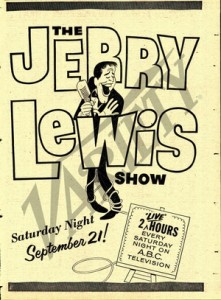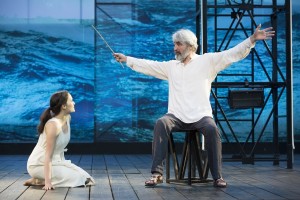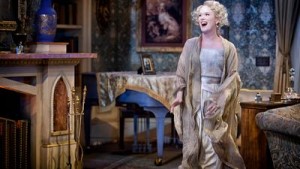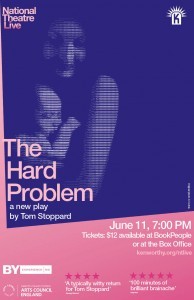 “Many were those whose sole knowledge of Hamlet (you know the title certainly, Montag; it is probably only a faint rumor of a title to you, Mrs. Montag) whose sole knowledge, as I say, of Hamlet was a one-page digest in a book that claimed: now at least you can read all the classics; keep up with your neighbors. Do you see? Out of the nursery into the college and back to the nursery; there’s your intellectual pattern for the past five centuries or more.”
“Many were those whose sole knowledge of Hamlet (you know the title certainly, Montag; it is probably only a faint rumor of a title to you, Mrs. Montag) whose sole knowledge, as I say, of Hamlet was a one-page digest in a book that claimed: now at least you can read all the classics; keep up with your neighbors. Do you see? Out of the nursery into the college and back to the nursery; there’s your intellectual pattern for the past five centuries or more.”
Ray Bradbury, Fahrenheit 451

 • How dare you talk about A when B is infinitely more important?
• How dare you talk about A when B is infinitely more important? Here’s a double-barreled example. On September 21, 1963, my family watched the chaotic debut episode of The Jerry Lewis Show, a two-hour-long live prime-time talk-and-variety show for whose forty-week season Lewis was reportedly paid a cool $8 million—at the time, the highest salary ever paid to a TV performer. The series, a legendary fiasco, was canceled after thirteen weeks. (You can read all about it
Here’s a double-barreled example. On September 21, 1963, my family watched the chaotic debut episode of The Jerry Lewis Show, a two-hour-long live prime-time talk-and-variety show for whose forty-week season Lewis was reportedly paid a cool $8 million—at the time, the highest salary ever paid to a TV performer. The series, a legendary fiasco, was canceled after thirteen weeks. (You can read all about it 
 At long last, here’s an online video of
At long last, here’s an online video of  To see “The Tempest” acted under a night sky is like hearing “The Messiah” sung in a cathedral. Whatever the flaws of the production, the sheer rightness of the setting usually makes them forgettable, or at least ignorable, and you come away thinking only of the work. That’s how I felt about Michael Greif’s Central Park production of Shakespeare’s sublime dramatic study of the redemptive power of forgiveness. I didn’t agree with all of Mr. Greif’s choices, but I was glad to go along with them, and by evening’s end my cavils felt picayune: Nothing mattered but the truth and beauty of the play itself.
To see “The Tempest” acted under a night sky is like hearing “The Messiah” sung in a cathedral. Whatever the flaws of the production, the sheer rightness of the setting usually makes them forgettable, or at least ignorable, and you come away thinking only of the work. That’s how I felt about Michael Greif’s Central Park production of Shakespeare’s sublime dramatic study of the redemptive power of forgiveness. I didn’t agree with all of Mr. Greif’s choices, but I was glad to go along with them, and by evening’s end my cavils felt picayune: Nothing mattered but the truth and beauty of the play itself. Noël Coward’s “Blithe Spirit,” that most shapely and cunning of farces, is so well made that it’s impossible to do badly—but hard to do memorably. Witness Michael Blakemore’s 2009 Broadway revival, in which Angela Lansbury’s delightfully dotty Madame Arcati failed to make a sufficiently strong impression because of the uninspired efficiency of the rest of the production. Not so the far superior version now playing at Baltimore’s Everyman Theatre. A starless production staged by Vincent M. Lancisi, the company’s artistic director, this “Blithe Spirit” is an all-cylinders romp in which Nancy Robinette plays Coward’s daft medium in a fluttery manner that immediately put me in mind of Elsa Lanchester—high praise indeed. Comparable kudos go to Beth Hylton, the ghost inadvertently summoned by Madame Arcati at a cocktail party, who plays Elvira as a sexy, dangerously willful woman-child. You’ll have no trouble whatsoever supposing that she’d be capable of scheming to bring about her earthly husband’s premature demise.
Noël Coward’s “Blithe Spirit,” that most shapely and cunning of farces, is so well made that it’s impossible to do badly—but hard to do memorably. Witness Michael Blakemore’s 2009 Broadway revival, in which Angela Lansbury’s delightfully dotty Madame Arcati failed to make a sufficiently strong impression because of the uninspired efficiency of the rest of the production. Not so the far superior version now playing at Baltimore’s Everyman Theatre. A starless production staged by Vincent M. Lancisi, the company’s artistic director, this “Blithe Spirit” is an all-cylinders romp in which Nancy Robinette plays Coward’s daft medium in a fluttery manner that immediately put me in mind of Elsa Lanchester—high praise indeed. Comparable kudos go to Beth Hylton, the ghost inadvertently summoned by Madame Arcati at a cocktail party, who plays Elvira as a sexy, dangerously willful woman-child. You’ll have no trouble whatsoever supposing that she’d be capable of scheming to bring about her earthly husband’s premature demise. Tom Stoppard, the English-speaking world’s brainiest playwright, thinks that British audiences have grown too dumb to understand his plays. In a February interview with the Telegraph that was occasioned by the National Theatre’s London premiere of “The Hard Problem,” his latest play, Mr. Stoppard complained that he now has to water down his punch lines: “It’s very rare to connect an audience except on a level which is lower than you would want to connect them on….You could raise it a notch and you might lose an eighth of them….I really resent it.” By way of illustration, he mentioned a scene in “Travesties,” one of his earlier plays, that contains a joke which hinges on knowing the name of Goneril, King Lear’s oldest daughter. “In 1974,” he said, “everybody in the audience knew who Goneril was and laughed. In about 1990 when the play was revived, maybe half knew.”
Tom Stoppard, the English-speaking world’s brainiest playwright, thinks that British audiences have grown too dumb to understand his plays. In a February interview with the Telegraph that was occasioned by the National Theatre’s London premiere of “The Hard Problem,” his latest play, Mr. Stoppard complained that he now has to water down his punch lines: “It’s very rare to connect an audience except on a level which is lower than you would want to connect them on….You could raise it a notch and you might lose an eighth of them….I really resent it.” By way of illustration, he mentioned a scene in “Travesties,” one of his earlier plays, that contains a joke which hinges on knowing the name of Goneril, King Lear’s oldest daughter. “In 1974,” he said, “everybody in the audience knew who Goneril was and laughed. In about 1990 when the play was revived, maybe half knew.”